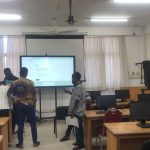Head of Social Division at the Institute of Statistical, Social and Economic Research (ISSER), Dr. Martha Awo has bemoaned the severe crisis being faced in the Ghanaian educational landscape.
According to data from 2017 to 2020, a steady decline in enrolment has been observed, reflecting a troubling situation that demands immediate attention. This trend of falling enrolment rates continue to plague schools at the basic levels.
“The declining enrolment rates at the junior high school and primary levels are indicative of a deteriorating state of our education system, it is crucial that we refocus our attention on the education sector to address the underlying issues.” She said.
Speaking at the launch of the Ghana Social Development Outlook, Dr. Martha Awo revealed that one of the major contributing factors to this decline is the persistent delay in disbursing school capitation grants, “leaving most schools in dire financial situations, often having to endure nearly a year of waiting before receiving their capitation for the previous academic year”. She stated.
Other factors highlighted were the delays in payments of school caterers which has been on the rise at an alarming rate. She explained that the allocated amount of 90 pesewas per child for providing nutritious meals in respective schools, is woefully inadequate and fails to meet the basic needs of students.
The Ghana Social Development Outlook (GDSO) is a biennial report and one of the flagship publications by the Institute of Statistical and Economic Research, ISSER. It comprehensively documents, with evidence, issues related to social development in Ghana.
Furthermore, Dr. Awo emphasized the urgency for policy interventions to address these critical imbalances within the education system.
“We must thoroughly assess the policy imbalances that contribute to these issues. The National Free SHS Financing initiative should be carefully examined to ensure its effectiveness and sustainability. Collaboration between stakeholders and increased investment in education are vital to reversing this downward trend.” She added.
Meanwhile, the Ministry of Education in response to these challenges, have expressed their commitment to tackling these issues, as efforts are underway to streamline capitation grant disbursements, address payment delays, and increase the funding allocation for nutritious school meals.
Story by: Adwubi Wiafe Akenteng| univers.ug.edu.gh




